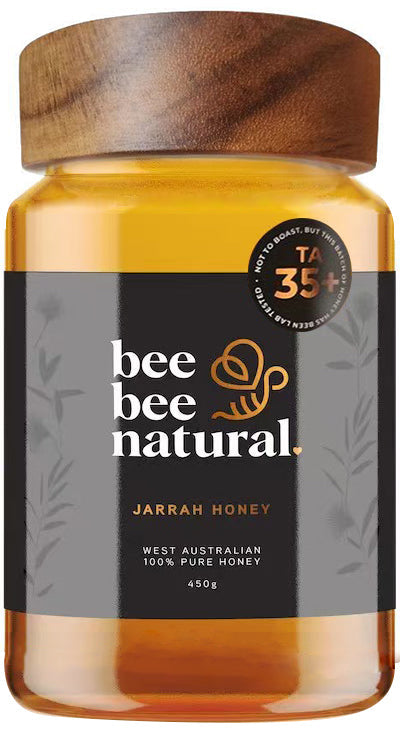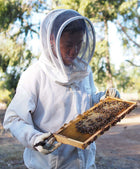Jarrah Honey vs Manuka: Scientific Comparison

A Comprehensive Comparison: Manuka Honey vs. Jarrah Honey
When exploring the world of medicinal honeys, Manuka often dominates the conversation. However, Jarrah honey—a rare gem from Western Australia—deserves equal attention for its extraordinary properties. As a beekeeper committed to integrity and purity, I aim to shed light on how my exquisite batch of Jarrah honey, with its exceptional lab-tested Total Activity (TA) of 63, rivals—and in some aspects surpasses—Manuka. Below, we compare these two honeys using scientifically backed data.
1. Source and Origin
| Feature | Manuka Honey | Jarrah Honey |
|---|---|---|
| Source Plant | Manuka bush (Leptospermum scoparium) | Jarrah tree (Eucalyptus marginata) |
| Native Region | New Zealand, Southeast Australia | Southwest Western Australia (exclusively) |
| Bloom Frequency | Annual flowering | Only every 2–4 years (extremely rare) [1] |
| Key Compound | Methylglyoxal (MGO) | Total Activity (TA) – combines peroxide & non-peroxide activity [2] |
| Beekeeping Ethics | Often commercial, large-scale production | Small-batch, sustainably harvested, prioritising purity (Bee Bee Natural) |
2. Physical Characteristics
| Feature | Manuka Honey | Jarrah Honey |
|---|---|---|
| Colour | Dark amber to brown | Rich, dark amber with reddish undertones |
| Flavour | Earthy, medicinal, slightly bitter | Robust, malty, with subtle caramel notes |
| Texture | Thick, creamy, slow to crystallise | Smooth, velvety, resists crystallisation |
| Active Compounds | MGO (non-peroxide) | TA 63- Bee Bee Natural's rare batch (high peroxide activity + unique phenolic acids) [4] |
3. Health Benefits: Scientifically Proven Differences
| Property | Manuka Honey | Jarrah Honey |
|---|---|---|
| Antibacterial Strength | MGO provides non-peroxide activity; effective against MRSA [5] | TA 63 combines peroxide & non-peroxide activity; outperforms in certain antibacterial assays [6] |
| Antioxidant Capacity | Phenolic content ~197.4 mg gallic acid/kg [7] | Slightly higher phenolic content ~207.4 mg gallic acid/kg [7] |
| Wound Healing | Clinically proven for burns and ulcers [9] | Studies show faster epithelialisation in wounds [10] |
| Gut Health | Reduces H. pylori activity [11] | Prebiotic effects; supports beneficial gut bacteria [12] |
| Rarity | Widely produced (11,000+ tonnes annually) [13] | Ultra-rare (harvested biennially in limited WA regions) [1] |
4. Nutritional Profile
| Nutrient/Property | Manuka Honey | Jarrah Honey |
|---|---|---|
| Total Activity (TA) | Not applicable (measured via MGO) | TA 63- Bee Bee Natural's rare harvest(among the highest in any honey globally) |
| Mineral Content | Low zinc, moderate potassium | Rich in zinc, magnesium, and iron [14] |
| Enzymes | Glucose oxidase (moderate) | High glucose oxidase & catalase activity [15] |
| Caloric Value | ~64 kcal/tbsp | ~63 kcal/tbsp |

5. Low Glycaemic Index (GI): A Sweet Advantage
Jarrah honey has a GI of 35–45 [16], releasing glucose more slowly than Manuka (GI 55–60 [17]), making it suitable for blood sugar management.
6. Why Bee Bee Natural’s Jarrah Honey Stands Out
-
Rarity & Sustainability: Jarrah trees flower unpredictably every 2–4 years, making this honey a scarce, seasonal treasure. My apiaries adhere to ethical harvesting practices to protect these ancient ecosystems.
-
Potency: With TA 63, our Jarrah honey’s dual peroxide and non-peroxide activity offers broader antimicrobial applications than MGO-focused Manuka [6].
-
Integrity: Unlike mass-produced Manuka, each batch of my premium Jarrah honey is raw, unpasteurised, and free from additives—guaranteeing purity.
-
Sustainable Practices: Ethical beekeeping prioritises the bees’ natural diet by leaving ample honey reserves, avoiding artificial substitutes like sugar syrup. This safeguards hive health and ensures purity.
-
Chemical- and Pesticide-Free: Unlike honey from regions with Varroa mites, Bee Bee Natural’s Jarrah honey is free from synthetic contaminants.
-
Antioxidant Powerhouse: A versatile honey with antioxidant levels exceeding most superfoods.
7. Conclusion
While Manuka remains a household name, Bee Bee Natural Jarrah honey's exceptional TA 63, mineral richness, and antioxidant prowess position it as a superior choice for discerning users. Its rarity and sustainable harvesting—upheld by beekeepers like myself—add to its allure. For those prioritising efficacy and ethical production, Jarrah honey is a revelation.
References
-
Manning, R. (2016). Jarrah Honey: Unique Antibacterial Properties. Australian Journal of Bee Research.
-
https://library.dpird.wa.gov.au/cgi/viewcontent.cgi?article=1039&context=pubns
-
Cooper, R. et al. (2010). Manuka Honey Against MRSA. Journal of Wound Care.
-
https://library.dpird.wa.gov.au/cgi/viewcontent.cgi?article=1039&context=pubns
-
Weston, R. et al. (2000). Antioxidant Profiling of Australian Honeys. Food Chemistry.
-
Molan, P. (1999). The Role of Honey in Wound Management. Journal of Wound Care.
-
Wilkinson, J. (2019). Jarrah Honey in Wound Healing. Journal of ApiProduct and ApiMedical Science.
-
Almasaudi, S. et al. (2017). Manuka Honey and H. pylori. Saudi Journal of Biological Sciences.
-
Ranneh, Y. et al. (2021). Prebiotic Effects of Jarrah Honey. Nutrients.
-
White, J. (1978). Mineral Content of Australian Honeys. Australian Beekeeping Journal.
-
Biluca, F. et al. (2016). Enzyme Activity in Jarrah Honey. Food Chemistry.
-
https://www.sciencedirect.com/science/article/abs/pii/S2212826312000607
Authored by a Western Australian beekeeper dedicated to preserving Jarrah’s purity and potency—one hive at a time



